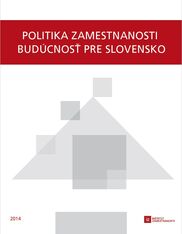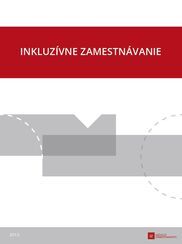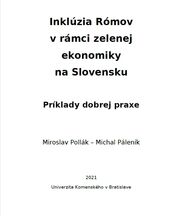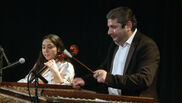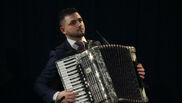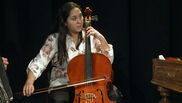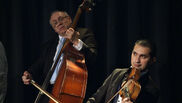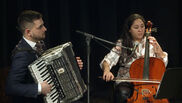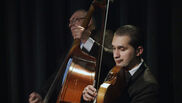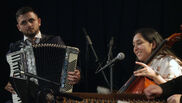Politika zamestanosti - Budúcnosť pre Slovensko
created: 15. 11. 2022 15:02 modified: 15. 11. 2022 15:02
Nezamestnanosť na Slovensku ako aj v Európskej únii sa dostala do popredia vnímania spoločnosti, politikov aj odbornej verejnosti. Negatívne dôsledky nezamestnanosti sú viditeľné na celej spoločnosti, nielen na osobách nezamestnaných. Cieľom publikácie je identifikovať prekážky, ktoré sociálny systém kladie zamestnanosti a navrhovať prospešné riešenia.
Zdroj: www.iz.sk
category: literature
Inkluzívne zamestnávanie
created: 15. 11. 2022 14:55 modified: 15. 11. 2022 14:58
Pod Inkluzívnym zamestnávaním rozumieme špecifickú formu štátom zaručenej šance pre dlhodobo nezamestnaných získať na určitú dobu štandardnú prácu, zvýšiť tým svoju životnú úroveň a následne zásadne zvýšiť svoje šance na otvorenom trhu práce. Publikácia, ktorá diskutuje jednotlivé aspekty a súvislosti inkluzívneho zamestnávania, je rozdelená do deviatich častí.
Zdroj: www.iz.sk
category: literature
Inklúzia Rómov v rámci zelenej ekonomiky na Slovensku
created: 15. 11. 2022 14:47 modified: 15. 11. 2022 14:58
V tejto monografii prepájame dva faktory, ktoré vplývajú na spoločnosť na Slovensku: vysokú nezamestnanosť ľudí z marginalizovaných rómskych komunít a nie ideálny stav životného prostredia. Ambíciou je ukázať, že tieto dva problémy sa dajú riešiť naraz a synergicky.
Zdroj: www.iz.sk
category: literature
When I Came to the Apple Tree - Július Žiga and the Band
created: 15. 11. 2022 11:22 modified: 15. 11. 2022 11:25
The core members of the family cimbalom band are the Žigas from Gelnica: father Július, his daughter Bohdana and son Filip. Guest members are Vladimír Plachetka, Kristián Bandy and Július Bandy. All of them are graduates of conservatories and are engaged in music production professionally. Bohdana Žigová and Filip Žiga were scholarship recipients of the Divé maky organization.
The song When I Came to the Apple Tree (Sar me geľom ke jablonka) is in two-quarter time, with a slower tempo during the verses and an accelerated tempo during the interludes. Bohdana Žigová interprets it with Romani lyrics.
Instruments and players: Július Žiga - double bass, Bohdana Žigová - cello, vocals, Filip Žiga - violin, Július Bandy - cimbalom, Kristián Bandy - viola, Vladimír Plachetka - accordion.
The record was created on December 11, 2021, at the Center for Independent Culture Wave in Prešov.
category: music
tags: vocal-instrumental modern folk sextet borrowed Romani The Folk Band of Július Žiga general audience internal
Czardas – The Folk Band of Július Žiga
created: 15. 11. 2022 10:00 modified: 15. 11. 2022 11:11
The core members of the family cimbalom band are the Žigas from Gelnica: father Július,his daughter Bohdana and son Filip. Guest members are Vladimír Plachetka, Kristián Bandy and Július Bandy. All of them are graduates of conservatories and are engaged in music production professionally. Bohdana Žigová and Filip Žiga were scholarship recipients of the Divé maky organization.
The presented composition is a czardasz, a dance song designed for couple dancing.
Instruments and players: Július Žiga - double bass, Bohdana Žigová - cello, vocals, Filip Žiga - violin, Július Bandy - cimbalom, Kristián Bandy - viola, Vladimír Plachetka - accordion.
The record was created on 11/12/2021, at the Center for Independent Culture Wave in Prešov.
category: music
tags: vocal-instrumental modern folk sextet borrowed Romani The Folk Band of Július Žiga general audience internal
Halgató – The Folk Band of Július Žiga
created: 15. 11. 2022 09:10 modified: 15. 11. 2022 09:32
The core members of the family cimbalom band are the Žigas from Gelnica: father Július, his daughter Bohdana and son Filip. Guest members are Vladimír Plachetka, Kristián Bandy and Július Bandy. All of them are graduates of conservatories and are engaged in music production professionally. Bohdana Žigová and Filip Žiga were scholarship recipients of the Divé maky organization.
The presented composition is a halgató, a slow and sentimental song intended for listening only, not dancing.
Instruments and players: Július Žiga - double bass, Bohdana Žigová - cello, vocals, Filip Žiga - violin, Július Bandy - cimbalom, Kristián Bandy - viola, Vladimír Plachetka - accordion.
The record was created on 11/12/2021, at the Center for Independent Culture Wave in Prešov.
category: music
tags: vocal-instrumental modern folk sextet borrowed Romani The Folk Band of Július Žiga general audience internal
Andro veš, andro veš (To the forest, to the forest) - The Folk Band of Július Žiga
created: 14. 11. 2022 13:53 modified: 14. 11. 2022 13:58
The core members of the family cimbalom band are the Žigas from Gelnica: father Július,his daughter Bohdana and son Filip. Guest members are Vladimír Plachetka, Kristián Bandy and Július Bandy. All of them are graduates of conservatories and are engaged in music production professionally. Bohdana Žigová and Filip Žiga were scholarship recipients of the Divé maky organization.
The song Andro veš, andro veš (To the forest, to the forest) is a dance song, the tempo changes from slow to very fast.
Instruments and players: Július Žiga - double bass, Bohdana Žigová - cello, vocals, Filip Žiga - violin, Július Bandy - cimbalom, Kristián Bandy - viola, Vladimír Plachetka - accordion.
The record was created on December 11, 2021, at the Center for Independent Culture Wave in Prešov.
category: music
tags: vocal-instrumental modern folk sextet borrowed Romani The Folk Band of Július Žiga general audience internal
Joj mamo, miri mamo (Ah Mum, My Mum) - The Folk Band of Július Žiga
created: 14. 11. 2022 12:44 modified: 14. 11. 2022 12:47
The core members of the family cimbalom band are the Žigas from Gelnica: father Július,his daughter Bohdana and son Filip. Guest members are Vladimír Plachetka, Kristián Bandy and Július Bandy. All of them are graduates of conservatories and are engaged in music production professionally. Bohdana Žigová and Filip Žiga were scholarship recipients of the Divé maky organization.
The song Joj mamo, miri mamo (Ah Mum, My Mum) is a dance song that aims to entertain the listeners and encourage them to dance.
Instruments and players: Július Žiga - double bass, Bohdana Žigová - cello, vocals, Filip Žiga - violin, Július Bandy - cimbalom, Kristián Bandy - viola, Vladimír Plachetka - accordion.
The record was created on December 11, 2021, at the Center for Independent Culture Wave in Prešov.
category: music
tags: vocal-instrumental modern folk sextet borrowed Romani The Folk Band of Július Žiga general audience internal
Čirikloro-mirikloro (Birdie-Beadie) - The Folk Band of Július Žiga
created: 14. 11. 2022 10:32 modified: 14. 11. 2022 11:30
The core members of the family cimbalom band are the Žigas from Gelnica: father Július,his daughter Bohdana and son Filip. Guest members are Vladimír Plachetka, Kristián Bandy and Július Bandy. All of them are graduates of conservatories and are engaged in music production professionally. Bohdana Žigová and Filip Žiga were scholarship recipients of the Divé maky organization.
The song Čirikloro-mirikloro (Birdie-Beadie) is performed as czardasz, a song for dancing while originally this song was a slow halgató.
Instruments and players: Július Žiga - double bass, Bohdana Žigová - cello, vocals, Filip Žiga - violin, Július Bandy - cimbalom, Kristián Bandy - viola, Vladimír Plachetka - accordion.
The record was created on December 11, 2021, at the Center for Independent Culture Wave in Prešov
category: music
tags: vocal-instrumental modern folk sextet borrowed Romani The Folk Band of Július Žiga general audience internal
Eňa ori rači (At Nine in the Evening) - The Folk Band of Július Žiga
created: 14. 11. 2022 10:23 modified: 14. 11. 2022 10:25
The core members of the family cimbalom band are the Žigas from Gelnica: father Július,his daughter Bohdana and son Filip. Guest members are Vladimír Plachetka, Kristián Bandy and Július Bandy. All of them are graduates of conservatories and are engaged in music production professionally. Bohdana Žigová and Filip Žiga were scholarship recipients of the Divé maky organization.
The song Eňa ori rači (At Nine in the Evening) is the slow and sentimental song, halgató. This type of songs are characterized by the romist Milena Hübschmannová (1988) as the ones with lyrics far more important than their melody, since one can say all with the song. In this song, the sister tells her brother that she fears for her life and begs him for protection.
Instruments and players: Július Žiga - double bass, Bohdana Žigová - cello, vocals, Filip Žiga - violin, Július Bandy -cimbalom, Kristián Bandy - viola, Vladimír Plachetka - accordion.
category: music
tags: vocal-instrumental modern folk sextet borrowed Romani The Folk Band of Július Žiga general audience internal




